Program Islamic Teacher Education Program (ITEP) anjuran Razi Group, biar pun hanya peringkat sijil, ia cukup mengenyangkan minda saya. Melanjutkan pelajaran melalui program atas talian ini, membantu saya mengenal dan segera menganalisis banyak aspek berkaitan sistem pendidikan dan sekolah, khususnya sekolah agama (faith based schools). Sebagaimana yang lazim dalam dunia akademik, pelajar dilatih untuk menukar kupasan kita terhadap satu-satu isu, kepada sebuah analisis ilmiah yang patuh kepada kerangka teori tertentu, jelas metode yang dipakai, dan sedaya upaya menjauhkan diri daripada dakwaan dan pendirian yang tidak berasas.
Itulah yang saya nikmati, setakat minggu ketiga pengajian. Untuk modul 101 antara September 2014 hingga Disember 2014 nanti, perbincangan kami merangkumi aspek berikut:
- Week 1 – Course Introduction
- Week 2 – Aims of Education
- Week 3 – Contemporary Understandings
- Week 4 – Religious Visions of Education
- Week 5 – Muslim Schools and Institutions in the West
- Week 6 – Islamic Pedagogy: Fluidity Practice
- Week 7 – Assignment 1 Questions
- Week 8 – The Concept of Education in Islam
- Week 9 – Classical Contributions to Islamic Education (General)
- Week 10 – Theory to Practice
- Week 11 – Worldview in Schools
- Week 12 – Worldview in Curriculum
- Week 13 – Assignment 2 Questions
Bagi setiap topik, kami akan diberikan dua artikel jurnal berkaitan, sesekali diberi rakaman video untuk ditonton, dan kami dikehendaki menulis ulasan jurnal pada setiap minggu serta mengaplikasikannya ke dalam konteks masing-masing. Oleh kerana semester ini para pelajar yang menyertai program ini begitu besar jumlah serta pelbagai latar belakangnya, perbincangan menjadi sangat menarik dan mencerahkan minda. Peserta berada di Australia, Singapura, Bangladesh (sebuah sekolah dengan hampir keseluruhan gurunya), Abu Dhabi UAE, United Kingdom, Nigeria, USA dan tuan rumah, iaitu Kanada. Manakala instructor kami semester ini adalah Encik Dylan Chown dari Brisbane, Australia. Seorang yang berpengalaman luas di dalam pendidikan, bukan hanya di sekolah-sekolah Islam Australia, tetapi juga di dalam urus tadbir kementerian dan jabatan kerajaan yang berkaitan. Setiap minggu, kami akan diperingatkan agar menepati rangka masa membaca, menganalisis, menulis, dan memberi komen kepada penulisan orang lain. Ia amat membantu memandangkan masing-masing sibuk dengan pelbagai tugasan.
Saya sendiri juga bekerja keras untuk menyesuaikan diri dengan komitmen ini di samping tugas menyelesaikan penulisan disertasi sarjana di UKM yang berada di fasa kritikal.
Program dikendalikan dengan menggunakan pelantar CANVAS yang dibangunkan oleh INSTRUCTURE. Saya dapati, pengurusan content untuk pengajian atas talian menggunakan pelantar ini efektif dan mudah diurus.
Semua ilmu pengetahuan baru yang saya perolehi (memandangkan saya bukan orang pendidikan), sangat berguna untuk saya manfaatkan dalam kerja sebagai Academic Director di Sekolah Menengah Mithali Khalifah hari ini. Ia juga mengingatkan saya betapa bukan satu kerja yang mudah untuk membangunkan sebuah sekolah, terutamanya sekolah yang mahu berdiri di atas fondisi yang betul bagi sebuah idea tentang pendidikan.
Tidak cukup sekadar mempunyai guru yang berijazah atau berdiploma, mempunyai wang dan kemudahan prasarana. Sebaliknya idea tentang pendidikan, terutamanya yang membabitkan kurikulum dan pedagogi mestilah kukuh. Bukan retorik.
Apabila dunia politik di negara kita digerakkan oleh ahli politik tanpa komitmen kepada ilmu berkaitan politik dan hanya berhujahkan pengalaman semata-mata, hala tuju politik di negara kita menjadi kecamuk. Kita tidak menghormati ilmu politik dan menganggap sesiapa sahaja boleh berpolitik mengikut ‘selera’ masing-masing. Mungkin perkataan selera itu negatif, tetapi ia bermaksud, kita berpolitik tanpa mempedulikan keputusan-keputusan yang kita buat itu, ada ilmunya, ada teorinya, dan semua itu penting untuk mengukur adakah kita masih berada di landasan yang betul, sebelum mengharapkan hasil yang betul.
Janganlah nasib malang yang menimpa politik negara kita merebak pula ke medan pendidikan.
Dan jika pendidikan semasa sudah pun dibelenggu oleh keputusan-keputusan politik yang tidak berpaksikan objektif pendidikan, semoga usaha-usaha yang dibuat di sekolah swasta, mampu menatijahkan idea-idea alternatif yang boleh disarankan untuk menyelamatkan pendidikan arus perdana.
Pengalaman peribadi saya mengendalikan kursus-kursus di sekolah-sekolah terbaik negara, timbul kekhuatiran yang besar. Jika selama ini kita menganggap golongan yang malang adalah mereka yang tercicir daripada peluang pendidikan, bagaimana pula jika masalah utama pendidikan itu adalah sistemnya? Tidakkah ini menjadikan pelajar yang mendapat akses penuh kepada sistem berkenaan, adalah mangsa utamanya.
Inilah yang mendesak saya untuk akur kepada permintaan Yayasan Pendidikan Khalifah, agar saya memberikan komitmen sepenuh masa ke Sekolah Menengah kami. Sekolah rendah di Ampang sudah beroperasi hampir sedekad dan Alhamdulillah ia berada di dalam keadaan yang baik. Nama Khalifah Model School (KMS) semakin dikenali dan idea-idea pendidikan berpaksikan Metode Khalifah semakin tersebar di dalam masyarakat. Akan tetapi Sekolah Menengah baru masuk usia 2 tahun. Metode Khalifah yang selama ini diaplikasikan kepada anak-anak murid sekolah rendah, kini terpakai untuk membentuk anak muda dan remaja.
Ia tidak mudah.
Tetapi tidak boleh cepat mengalah.
Guru-guru tidak boleh mengajar secara random. Salah laku tidak boleh ditangani sesuka hati. Manusia adalah makhluk Allah yang sangat mulia, Allah menjadikannya dengan begitu sempurna, maka proses membentuk seorang manusia dari kanak-kanak menuju dewasa mesti dilakukan dalam semangat “Sesungguhnya Kami telah memuliakan Bani Adam!” [Al-Isrā’ 17: 70].
Saya kongsikan tugasan yang saya terima untuk minggu kedua kami. Saya diberikan sebuah senario di dalam kelas Sains pelajar Gred 8, apabila seorang pelajar pintar bernama Khalid bertanya tentang teori evolusi dan pendirian Islam mengenainya. Kesimpulan Khalid ialah, teori evolusi itu adalah kebenaran yang tidak boleh diragukan kesahihannya, berdasarkan bukti-bukti yang begitu banyak. Guru kelas berkenaan, Cikgu Salwa, telah mengambil keputusan untuk membentuk sebuah projek kelas, dan pelajar diberi kebebasan sama ada mahu berada di pihak creationism atau evolutionism, lalu mengkaji dan membentangkan hasil kajian mereka dalam apa-apa bentuk yang mereka pilih, kepada rakan sekelas.
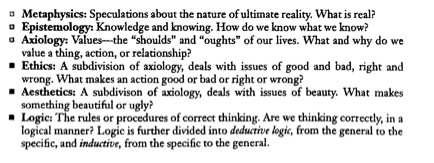
Gutek’s

Sadker and Sadker
Saya dikehendaki menganalisis situasi ini berpandukan kupasan Gutek serta artikel Sadker and Sadker berkenaan falsafah dan pendidikan.
Berikut adalah rumusan saya sekadar yang termampu:
PART 1
Similar question regarding the evolution can emerge in other classes such as History and Tafseer. But in Khalid’s case, he raised the question in the Grade 8 science class and it falls under the metaphysics as well as the epistemological aspect of knowledge. The question emerged perhaps either from what Khalid read and heard, or what he observed from the reality. His reading told him something about the flora and fauna, but mainly the man and his nature, his origin and events occurred in history as the consequences of those ‘reality’. His observation triggered him to understand why some animals in supposedly remote island like platypus in Tasmania have unique characters that create its own categories, why cabbage grows in cities is relatively smaller than those grow in rural farm.
His ears and eyes gave him some ideas that evolution does exist, but is it real? And what that makes him, a good person or not, to believe such thing? Some ethical issues involved and perhaps it led him to ask Islam’s stand on evolution.
He concluded after examining the scientific evidence to support evolution that it’s real and indisputable. He analyze the evidence using some logical process, which could be deductive if based on his readings, and inductive if based on his observation. Perhaps he did not do the same process to establish his understanding on the Islamic aspect of evolution, believing that Islam established facts and realities based on the holiness of the scripture and cannot be evaluate empirically (which is not true, but the empirical aspect to establish the Quran as a Word of God is commonly ignored)
All these will question the students as well as the teachers’ world view and how Islam became the source and foundation of our epistemology in dealing with metaphysics, axiology, ethics and aesthetics. In order to do so, al-Quran and Islam itself consistently urge human to think, and embrace the procedures of correct thinking (the Logic).
PART 2
Teacher Salwa demonstrated how a student-centered approach tackles this challenge. She did not impose her stand as anessentialist or as a perennialist by directing her students to limited classical references. She created a progressive classroom, facilitate the students to discuss among themselves and even let the students decide how they want their finding to be presented. By specifying the angle of creationists and evolutionists, Teacher Salwa might also offer some aspects of social reconstructionism, examining the existing arguments between both parties which led to many debates among the society, but mainly outside the sphere of Muslim community. Perhaps by not introducing the limited boundary of creationism and evolutionism, students will not easily trapped in the mainstream approach to resolve the ethical questions around evolution.
PART 3
I believe that both Gutek and Sadker & Sadker’s materials are ethnocentrism as Sadker & Sadker mentioned on page 347. The development of ideas are chronologically related to specific experiences recorded by history, mainly in Europe and America. Both teacher-centered and student-centered approaches have their own extreme sides. The teacher-centered education might lead to dogmatic approach believing that all questions are already answered in the past and they can be obtained from the established and known ‘great books’. This phenomena occurred beyond the boundary of race and religion. The same pattern exists in Christian World as well as the Muslim. On the other hand, the student-centered approach also have the constructivists who set an environment where there is no ‘absolute truth’ for us to refer and hold. With the incompetent teachers and harsh flow of information today, children might end up have nothing solid to hold as their source of belief.
I think, it is important for Muslim educationits to understand the historical background of the ideas which always related to specific contexts in history. We might see Muslim scholars like al-Tabari (839–923) and Ibn Miskawayh (932–1030) discussed about some early ideas about evolution to establish the writings on World History they might not belong to neither creationists nor evolutionists as understood today. I will take Khalid’s question about evolution theory as a way for me to integrate history, science and Usul al-Din in my Progressive Classroom.
PART 4
Usually when Muslims heard the word evolution, many would quickly think about the Darwinism, the origin of man, were human being apes etc. I can still remember when I took my students to Belfast Zoo in Northern Ireland, one of my students saw orang utan or gorilla, he said “look, it’s our grandfather!” I was laughing at that time, but then felt sad and worry. I am not a man of science. My first degree was in Islamic Studies. So, if any of our colleagues found my argument wrong, please do not hesitate to correct me and guide me to a sound stand on this matter.
What I understand, Charles Darwin is one thing, evolution theory is one thing, implementing Darwin’s theory upon human being is also another thing. Here came names like Herbert Spencer who was known as Social Darwinist who implemented Darwin’s theory on human being. There were chain of events and developments before Social Darwinism involved in colonialism and became a political concern. So, we can actually separate evolution theory from Charles Darwin, Herbert Spencer, the origin of man, colonialism etc. What worries me is when evolution theory is solidly placed against Islam, many students, particularly in biology will face dilemma, especially at the university level. In our country, we had students who were so troubled with this issue and caught in a position to choose between Islam and science simply because they were told that evolution theory is 100% against Islam, while in their lectures, they’re convinced that there are ‘some’ truth to be considered regarding the validity of evolution theory (which has nothing to do with the claim that men were apes).
This issue is not limited only to science class.
When students study history, one of the subjects to be tackled is the historiography of World History. Students will study how historians from different civilizations perceived this world and reflected it in their writing. If we take a quick look at our great books of history like Tarikh al-Tabari, we’ll see that before the creation of Adam, there were at least 10 chapters including the idea of time, the creation of the earth and heaven and who inhabited this world before Adam. This area is problematic. We found many skeletons all over the world which scientifically they show that their age reached even more than 1 million years old, long before what we understand about the period between Adam and Muhammad peace be upon them (perhaps only around 50,000 years based on some riwayah from Rasulullah PBUH and his companions).
Who were these skeletons?
The interesting part is, our early scholars like Ibn Miskawayh (932–1030) or Ebn Meskavayh, regardless of the limited access to scientific research at that time, explored this issue.
Ibn Miskawayh was one of the first to clearly describe a version of the idea of evolution. Muhammad Hamidullah describes the evolutionary ideas found in Ibn Miskawayh’s al-Fawz al-Asghar as follows:
“[These books] state that God first created matter and invested it with energy for development. Matter, therefore, adopted the form of vapour which assumed the shape of water in due time. The next stage of development was mineral life. Different kinds of stones developed in course of time. Their highest form being mirjan (coral). It is a stone which has in it branches like those of a tree. After mineral life evolves vegetation. The evolution of vegetation culminates with a tree which bears the qualities of an animal. This is the date-palm. It has male and female genders. It does not wither if all its branches are chopped but it dies when the head is cut off. The date-palm is therefore considered the highest among the trees and resembles the lowest among animals. Then is born the lowest of animals. It evolves into an ape. This is not the statement of Darwin. This is what Ibn Maskawayh states and this is precisely what is written in the Epistles of Ikhwan al-Safa. The Muslim thinkers state that ape then evolved into a lower kind of a barbarian man. He then became a superior human being. Man becomes a saint, a prophet. He evolves into a higher stage and becomes an angel. The one higher to angels is indeed none but God. Everything begins from Him and everything returns to Him.”
Further details can also be obtained from some journals like:
http://www.iranicaonline.org/articles/meskavayh-abu-ali-ahmad
http://ejournal.ukm.my/islamiyyat/article/viewFile/2507/1732
There is a speculation saying that maybe Charles Darwin himself had the access to Ibn Miskawayh’s materials but I don’t have much info on this matter. It was also said that Charles Darwin read Arabic.
The evolution and the origin of man also emerged in our schools here in Malaysia in the class of Tafseer, in Surah al-Baqarah verse 30. When Allah mentioned that He is to create Adam as the Khalifah, the Malaikah asked for clarification about the reason. They have some brief idea about the potential of Adam and his children to spread blood and mischief, even before Adam was created. Where did that knowledge come from? Al-Tabari argued that the Malaikah compared Adam to Jinn. While our students speculated, were there ‘Adam(s)’ before our Adam?”
This topic is difficult. Our students are curious. They cannot avoid the controversies surrounding the issue, and they want their Islamic Studies teachers to clarify what does Islam say about evolution.
So, in our experience, we wont ‘kill’ the curiosity. We cannot silent them. Instead we encouraged them and allow them to explore all the puzzles by guiding them to the relevant materials. We did not reach any definitive conclusion but we inform our students that this case really demonstrates how important for future Muslim scholars to have a strong and broad knowledge, inter-discipline, and have the braveness like Ibn Miskawayh to explore the knowledge of Allah.
Wallahu A’lam.
Kami tidak dikenakan apa-apa format tertentu dalam penulisan. Tumpuan dikehendaki diberikan kepada kefahaman dan kebolehan untuk menerangkannya. Rakan-rakan lain dikehendaki memberi komen dan kesemua interaksi kami dipantau dengan teliti oleh instructor.
Semua yang dibahaskan ini, memandu saya untuk menentukan hala tuju perjalanan pendidikan di KMSS yang kami cintai. Semoga ilmu pengetahuan yang diperolehi turut dapat dimanfaatkan oleh guru-guru kami dan masyarakat seluruhnya. Biarlah proses untuk membangunkan sebuah sekolah itu susah, kerana ia bukan permainan.
Pertaruhannya adalah masa depan anak-anak kita.
Masa depan negara.
Masa depan ummah seluruhnya.
HASRIZAL
43000 BSP
 Saifulislam.Com Pendidikan Jalan Islah
Saifulislam.Com Pendidikan Jalan Islah

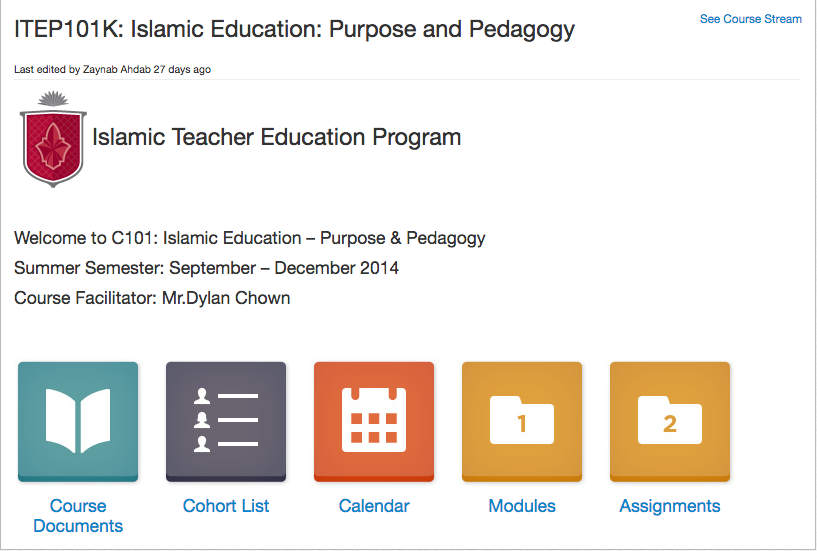
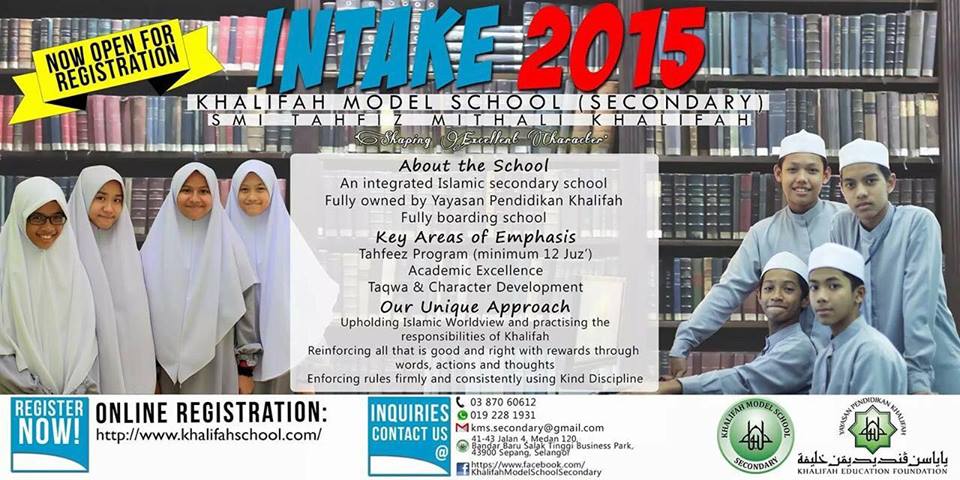
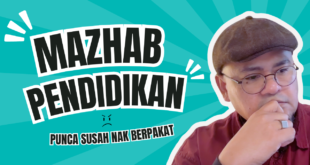
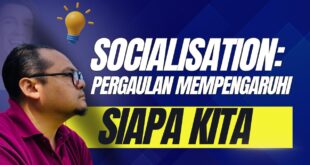
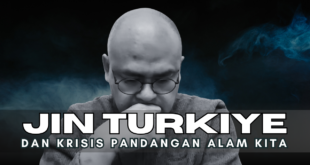
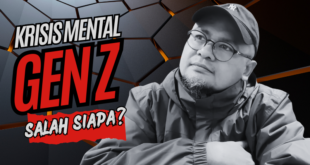
Subhanallah.. Jika inginkan perubahan, kita yang perlu mulakan dulu. Tak perlu tunggu mana-mana pihak pon.
Selamat berjuang & selamat berjaya, ustaz.